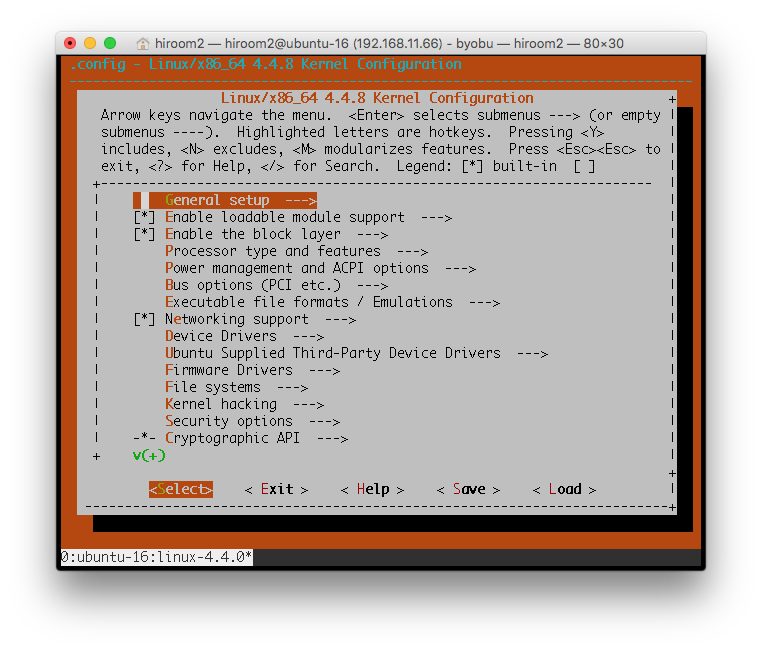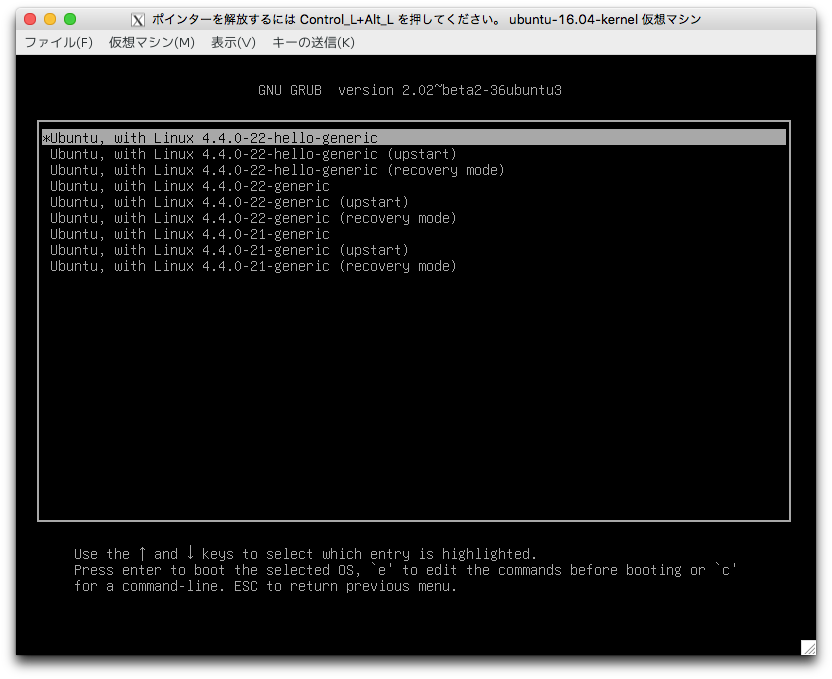This article will describe rebuilding kernel with devscripts.
Because trying rebuilding kernel with devscripts as much as possible, this is a bit strange way besides rebuilding mainline kernel.
Table of Contents
1 Install package for building kernel
"make menuconfig" needs libncurses5-dev.
$ sudo apt build-dep -y linux $ sudo apt install -y libncurses5-dev
2 Download kernel source code
Download kernel with git is better than with deb-src because git tag is available for switching release version.
If you run "fakeroot debian/rules distclean", you need to run below command again.
If you run "fakeroot debian/rules clean", you do not need to run.
$ fakeroot debian/rules debian/control $ cp debian.master/changelog debian/
2.1 Download with deb-src
You need to run "chmod -R u+x debian/scripts/*".
You need to run "fakeroot debian/rules distclean" for avoiding compile error because of generated files remaining.
$ mkdir linux.ubuntu-16.04 $ cd linux.ubuntu-16.04 $ apt source linux $ cd linux-4.4.0 $ chmod -R u+x debian/scripts/* $ fakeroot debian/rules distclean $ fakeroot debian/rules debian/control $ cp debian.master/changelog debian/
2.2 Download with git
Download with git is nearly the same with deb-src.
$ git clone git://git.launchpad.net/~ubuntu-kernel/ubuntu/+source/linux/+git/xenial $ cd xenial $ fakeroot debian/rules debian/control $ cp debian.master/changelog debian/
3 Edit changelog
debian/changelog will change the deb file name suffix.
You can edit changelog with debchange command.
$ sudo apt-get install -y devscripts $ EDITOR=emacs debchange
Append below log to debian/changelog.
This will change the suffix from 4.4.0-22.39 to 4.4.0-22.39ubuntu1.
linux (4.4.0-22.39ubuntu1) UNRELEASED; urgency=medium * Hello, Linux -- <hiroom2@ubuntu-16.04> Mon, 16 May 2016 17:52:06 +0900
4 Edit kernel configuration
You can edit kernel configuration with "fakeroot debian/rules editconfigs".
Edit only amd64/config.flavour.generic.
$ fakeroot debian/rules editconfigs dh_testdir; /bin/bash -e debian/scripts/misc/kernelconfig editconfigs Do you want to edit config: amd64/config.flavour.generic? [Y/n] Y
"make menuconfig" dialog is displayed.

Save the kernel configuration. Skip other configuration.
Do you want to edit config: amd64/config.flavour.lowlatency? [Y/n] n <snip> check-config: 31/43 checks passed -- exit 1 *** ERROR: 12 config-check failures detected
The config-check scripts will output error but it also outputs error with default configuration.
5 Edit source code
If you already built kernel, you need to remove debian/stamp/stamp-build-generic for recompiling source code.
Change source code as below.
diff --git a/init/main.c b/init/main.c
index 9e64d70..1ecc819 100644
--- a/init/main.c
+++ b/init/main.c
@@ -933,6 +933,8 @@ static int __ref kernel_init(void *unused)
{
int ret;
+ printk("Hello, Linux");
+
kernel_init_freeable();
/* need to finish all async __init code before freeing the memory */
async_synchronize_full();
6 Change file name version (bad know-how)
Editing changelog can change deb file name but not change file name in deb file.
If you install deb file which name is changed by editing changelog, vmlinux-xxx and initrd-xxx will be overwrite because vmlinux-xxx and initrd-xxx name is not changed by editing changelog.
CONFIG_LOCALVERSION is used for changing vmlinux-xxx and initrd-xxx on mainline kernel, but devscripts will output error when CONFIG_LOCALVERSION is enabled.
So use abi_suffix variable which is used for suffix name of vmlinux-xxx and initrd-xxx in debian/rules. Export abi_suffix as "-hello" for append "-hello" to suffix.
$ export abi_suffix=-hello
If abi_suffix is used, xenial/drivers/hv/hv.c will be compile error.
Edit debian/rules.d/0-common-vars.mk as below for avoid this error.
diff --git a/debian/rules.d/0-common-vars.mk b/debian/rules.d/0-common-vars.mk
index 1c87ebd..2b1fa67 100644
--- a/debian/rules.d/0-common-vars.mk
+++ b/debian/rules.d/0-common-vars.mk
@@ -224,7 +224,7 @@ kmake = make ARCH=$(build_arch) \
CONFIG_DEBUG_SECTION_MISMATCH=y \
KBUILD_BUILD_VERSION="$(uploadnum)" \
LOCALVERSION= localver-extra= \
- CFLAGS_MODULE="-DPKG_ABI=$(abinum)"
+ CFLAGS_MODULE="-DPKG_ABI=$(shell echo $(abinum) | sed 's/$(abi_suffix)//g')"
ifneq ($(LOCAL_ENV_CC),)
kmake += CC=$(LOCAL_ENV_CC) DISTCC_HOSTS=$(LOCAL_ENV_DISTCC_HOSTS)
endif
If export abi_suffix, you need to run "fakeroot debian/rules debian/control" for update package name in control information.
$ fakeroot debian/rules debian/control
7 Build kernel
If you already build kernel, you need to remove below files for compiling source code again.
$ rm -rf debian/stamps/stamp-build-generic $ rm -rf debian/linux-image-extra-*/lib/modules/*/kernel/kernel
For reducing compile time, do_tools=false could stop build linux-cloud-tools.
If you have many cpu cores, making paralles be more lager and compile time is shorter.
$ DEB_BUILD_OPTIONS=parallel=2 do_tools=false no_dumpfile=1 \ fakeroot debian/rules binary-generic
After build is completed, deb file is created.
$ ls ../*.deb linux-headers-4.4.0-22-hello-generic_4.4.0-22.39ubuntu1_amd64.deb linux-image-4.4.0-22-hello-generic_4.4.0-22.39ubuntu1_amd64.deb linux-image-extra-4.4.0-22-hello-generic_4.4.0-22.39ubuntu1_amd64.deb
Install linux-image deb file and files which have a "-hello" suffix are copied to /boot
$ sudo dpkg -i linux-image-4.4.0-22-hello-generic_4.4.0-22.39ubuntu1_amd64.deb $ ls /boot/ System.map-4.4.0-21-generic initrd.img-4.4.0-22-generic System.map-4.4.0-22-generic initrd.img-4.4.0-22-hello-generic System.map-4.4.0-22-hello-generic initrd.img-4.4.0-22-mykernel-generic abi-4.4.0-21-generic lost+found abi-4.4.0-22-generic memtest86+.bin abi-4.4.0-22-hello-generic memtest86+.elf config-4.4.0-21-generic memtest86+_multiboot.bin config-4.4.0-22-generic vmlinuz-4.4.0-21-generic config-4.4.0-22-hello-generic vmlinuz-4.4.0-22-generic grub vmlinuz-4.4.0-22-hello-generic initrd.img-4.4.0-21-generic
Reboot Ubuntu 16.04.
$ sudo reboot
Display GRUB menu with ESC key after BIOS boot. Select "Advanced options for Ubuntu" and you can find "-hello" kernel entry.

"Hello, Linux" is output to kernel log and kernel version is changed.
$ dmesg | grep -2 "Hello, Linux" [ 0.029550] Freeing SMP alternatives memory: 28K (ffffffff820b3000 - ffffffff820ba000) [ 0.034677] ftrace: allocating 31906 entries in 125 pages [ 0.064341] Hello, Linux [ 0.064360] smpboot: Max logical packages: 1 [ 0.064362] smpboot: APIC(0) Converting physical 0 to logical package 0 $ $ uname -r 4.4.0-22-hello-generic